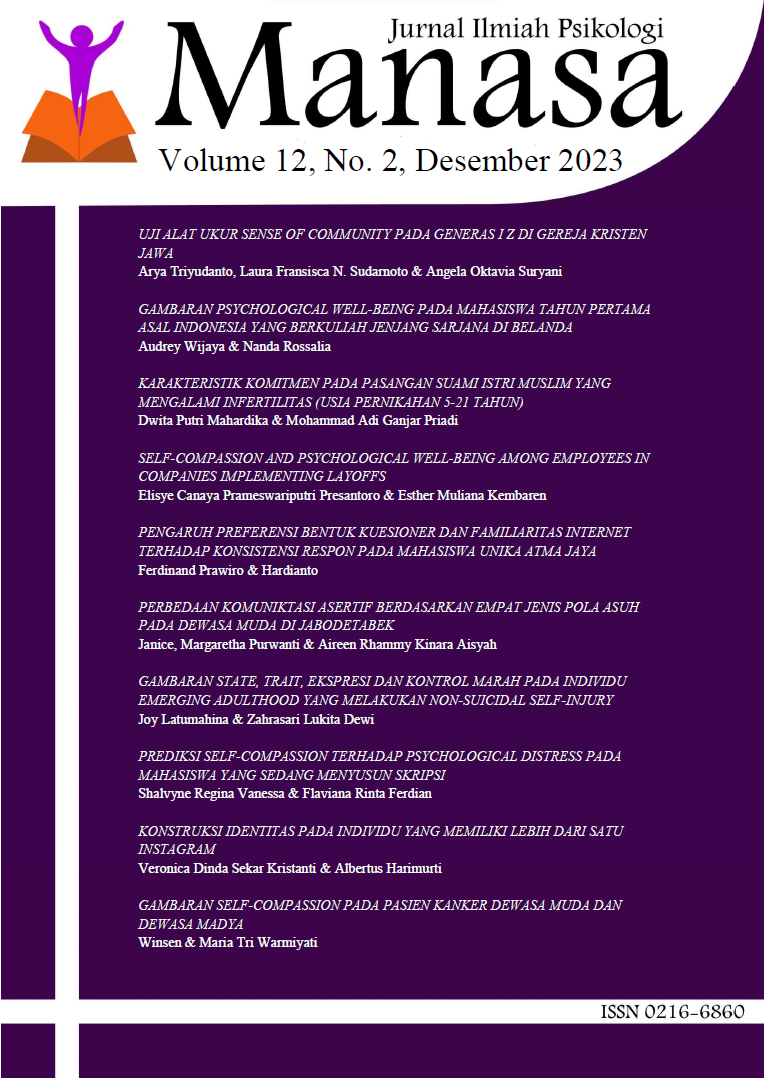KARAKTERISTIK KOMITMEN PADA PASANGAN SUAMI ISTRI MUSLIM DENGAN KONDISI INFERTILITAS (USIA PERNIKAHAN 5-21 TAHUN)
DOI:
https://doi.org/10.25170/manasa.v12i2.4812Keywords:
married couples, infertility, commitment, offspringAbstract
This study aim is to find out about the commitment and characteristic of married couples who experience infertility. Nowadays, getting married and producing offspring is still a social demand in society. This also still happening in Indonesia. As the country with the largest Muslim population in the world, many people decide to get married for religious and hereditary reasons. Unfortunately, not everyone can easily produce offspring after marriage. For people who experience infertility, the demand to have children able to trigger conflicts in their domestic life. In addition, the psychological dynamics that occur are often not easy to deal with, while trying to produce offspring. To get through this experience, couples need strong commitment. Types of commitment are divided into personal, moral, and structural commitments. This study is a descriptive qualitative study involving four married couples with a marriage age of 5-21 years. The data collection technique was conducted by semi-structured interviews. The results showed that all three aspects of commitment appeared in the participants, namely personal, moral, and structural commitment. Additional research results also revealed that aspects of religiosity played a role in generating commitment to maintain marriage in four pairs of participants.
Keywords: married couples, infertility, commitment, offspring.
References
Bell, A. (2015). Overcoming (and Maintaining) Reproductive Difference: Similarities in the Gendered Experience of Infertility. Journal Qualitative Sociology.
Hapsari & Septiani. (2015). Kebermaknaan Hidup pada Wanita yang Belum Memiliki Anak
Tanpa Disengaja. Jurnal Penelitian dan Pengukuran Psikologi. Vol 4 No.2.
Horton, L. (2008). Crumbling Commitment: Managing a Marital Crisis 1st (Ed.). Lulu.com.
Laurer & Laurer. (2012). Marriage & Family (6th ed.). NY: McGraw-Hill.
Lindsey, B. & Driskill, C. (2013). The Psychology of Infertility. International Journal of Childbirth Education, 28 (3).
Pandanwati & Suprapti. (2012). Resiliensi Keluarga Pada Pasangan Dewasa Madya yang Tidak Memiliki Anak. Jurnal Psikologi Pendidikan dan Perkembangan, 1(03).
Pryor J., & Roberts J. (2005). Family Matters. Melbourne: Australian Institute of Family Studies.
Strough J, McFall J.P., & Schuller K. L. (2010). Endorsement of Interpersonal Strategies for Dealing with Hypothetical Everyday Arthritis Problems as a Function of Marital Status, Gender, and Problem Severity. The International Journal of Aging and Human Development. (1):39-59. doi:10.2190/AG.70.1.b
Thuy Anh, D. T. (2018). Asian Parenting. Youtube. https://www.youtube.com/watch?v=cNxm8MMcXlw
U.S. Congress, Office of Technology Assessment. (1988). Infertility: Medical and Social Choices. Washington, DC: U.S. Government Printing Office.
Widiyani, R. (2019). Usia Nikah Makin Mundur Bayi Tabung Diperkirakan Ngetren di 2019. Detik: Diakses pada tanggal 12 Oktober 2019 dari health.detik.com
Yin, R. J. (2011). Qualitative Research from Start to Finish. New York: The Guilford.
Downloads
Published
Issue
Section
License
Copyright (c) 2023 MANASA

This work is licensed under a Creative Commons Attribution-NonCommercial-ShareAlike 4.0 International License.









.png)
.png)

